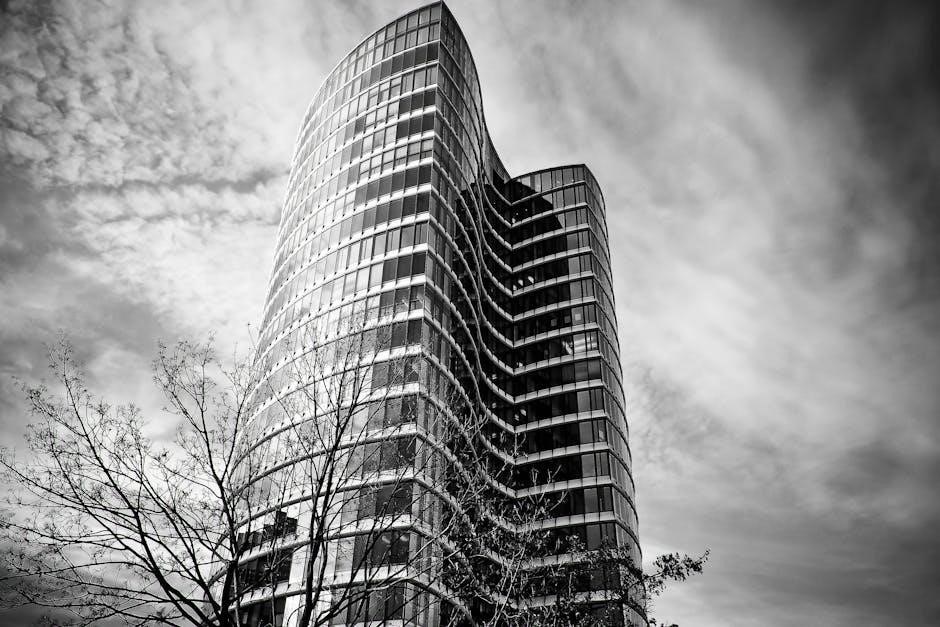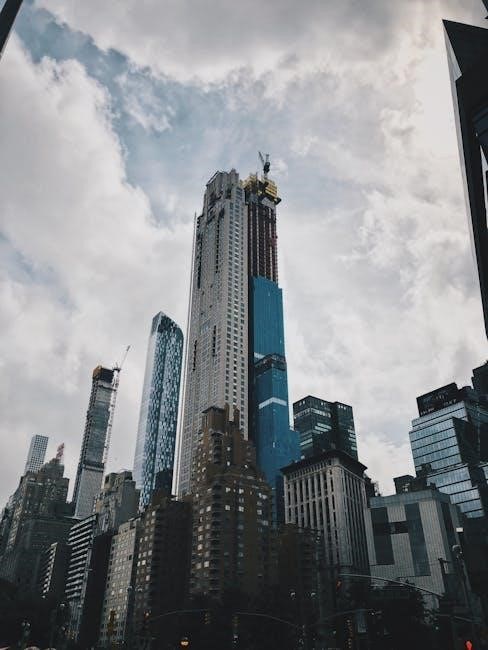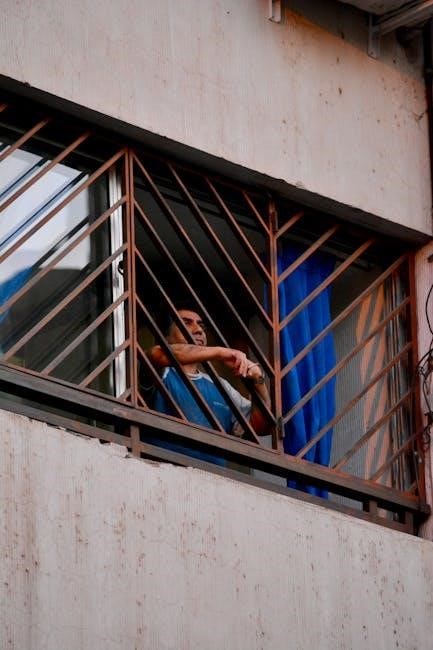The essay explores Andre Dubus III’s journey from financial struggle to sudden wealth, highlighting the emotional emptiness and anxiety that often accompany luxury, set against the backdrop of a lavish New York City trip․
1․1 Overview of the Concept
The concept of “The Lows of the High Life” delves into the paradox of wealth and its unforeseen emotional toll․ Andre Dubus III recounts his journey from financial scarcity to sudden affluence, detailing how newfound wealth led to feelings of emptiness and disconnection․ Set against the backdrop of a lavish trip to New York City, the narrative examines the tension between material comfort and inner fulfillment, highlighting the often-overlooked challenges of privilege․
1․2 Relevance in Modern Society
The concept of “The Lows of the High Life” resonates deeply in today’s society, where the pursuit of wealth and materialism often overshadows emotional well-being․ The essay highlights the illusion of fulfillment that wealth promises, offering a timely critique of modern consumerism․ By sharing personal struggles with sudden affluence, the narrative provides a relatable lens through which readers can reflect on their own relationships with money, status, and happiness in a hyper-materialistic world․

Emotional Struggles of Sudden Wealth
Sudden wealth often triggers emotional turmoil, as individuals grapple with feelings of emptiness and anxiety amidst luxury, highlighting the psychological challenges of navigating newfound affluence․
2․1 Psychological Impact of Wealth
The psychological impact of wealth often manifests as emotional detachment and anxiety․ Andre Dubus III experienced this firsthand, describing feelings of emptiness and disconnection despite his newfound financial status․ His essay reveals how wealth can amplify internal conflicts, leading to a sense of identity loss and a struggle to reconcile past hardships with present affluence․ This emotional turmoil underscores the complex relationship between money and mental well-being․
2․2 Societal Pressures and Expectations
Wealth often brings societal pressures to maintain a certain image or lifestyle, which can be overwhelming․ Andre Dubus III describes feeling guilty and confused about how to handle his newfound wealth, highlighting the tension between enjoying luxury and fulfilling responsibilities․ The pressure to conform to societal expectations creates emotional conflict, as seen in his reluctance to embrace the lavishness of New York City, fearing it would change who he fundamentally was․
The New York Setting
New York City serves as a backdrop of both opulence and chaos․ The essay vividly portrays landmarks like Central Park West and Grand Central Station, capturing the city’s exhausting yet iconic energy․
3․1 Portrayal of City Life
Andre Dubus III paints New York City as a paradox of luxury and overwhelm․ The bustling streets, iconic landmarks, and high society contrast with the author’s internal struggle, revealing the city’s dual nature of beauty and exhaustion, where excess coexists with emptiness, creating a vivid yet disorienting urban landscape․
3․2 Iconic Landmarks in the Narrative

New York City’s iconic landmarks, such as Central Park West and Grand Central Station, are vividly portrayed in the essay․ These locations symbolize luxury and excess, yet they also serve as backdrops for the author’s growing sense of disconnection․ The bustling energy of these landmarks contrasts with the emotional emptiness, highlighting the tension between the city’s grandeur and the author’s internal struggle․
Andre Dubus III’s Personal Journey
Andre Dubus III’s essay recounts his transition from financial struggle to sudden wealth, detailing how his newfound money led to a three-day extravagance in New York City․
4․1 Background and Financial Shift
Andre Dubus III’s life transformed after the success of his novel, A House of Sand and Fog․ Raised in a financially strained household, he recall his mother serving saltine crackers for dinner․ The sudden wealth brought luxury, but also discomfort․ He spent lavishly in New York, yet felt disconnected and anxious, grappling with the emptiness of excess and questioning his identity in this new financial reality․
4․2 The NYC Trip Experience
Andre Dubus III’s three-day trip to New York highlighted the disorienting effects of newfound wealth․ Staying at luxury hotels like the Royalton and dining at upscale restaurants, he felt disconnected and uneasy․ Despite the extravagance, the experience left him unfulfilled, emphasizing the emptiness of material excess․ His attempt to share this lifestyle with his blind aunt, Jeannie, further underscored the emotional disconnect, revealing the hollow allure of luxury․
Themes of Disconnection and Anxiety
The essay highlights emotional emptiness and anxiety tied to wealth, as luxurious settings like high-end hotels and restaurants ironically foster feelings of isolation and disconnection․
5․1 Feelings of Isolation
Dubus III describes how sudden wealth led to emotional detachment, as luxurious experiences in New York City, like staying at the Royalton, paradoxically heightened feelings of isolation and disconnection from his true self and others, emphasizing the emptiness behind material comfort․
5․2 Anxiety in a Luxurious Environment
Andre Dubus III recounts how the extravagance of New York City’s elite environments, such as the Royalton, triggered profound anxiety and a sense of disconnection․ The opulence, meant to bring comfort, instead amplified feelings of alienation, as the sudden wealth clashed sharply with his humble upbringing, revealing the emotional toll of navigating a world far removed from his roots․

Luxury and Emptiness
Luxury often masks a void, as seen in Andre Dubus III’s experience, where newfound wealth failed to satisfy deep emotional needs, leaving a hollow, unfulfilled sensation․
6․1 The Illusion of Fulfillment
The high life often promises fulfillment but delivers emptiness․ Andre Dubus III’s experience reveals how luxury, despite its allure, fails to satisfy deeper emotional and psychological needs․ The lavish settings of New York City, from Central Park West to Grand Central Station, highlight the disconnect between material wealth and true satisfaction․ This illusion underscores the gap between societal expectations of luxury and the hollow reality it often conceals;
6․2 Searching for Meaning
Amidst the opulence of New York City, Andre Dubus III’s journey reveals a profound search for meaning beyond wealth․ The excess of luxury, from five-star hotels to lavish spending, fails to fill the emotional void․ His story highlights how material abundance often masks a deeper desire for connection and purpose, underscoring the idea that true fulfillment stems from within, not from external possessions or status․

High vs․ Low Life in NYC
New York City’s stark contrasts reveal a world where luxury and poverty coexist, from opulent hotels to impoverished streets, reflecting the city’s economic and social divide․
7․1 Economic Disparities
New York City’s economic landscape is marked by vast inequalities, with affluent neighborhoods like Manhattan contrasting sharply with underprivileged areas․ This divide highlights systemic issues of wealth distribution, as luxury coexists with poverty, creating stark visual and social contrasts that underscore the city’s economic disparities, a theme central to “The Lows of the High Life” narrative․
7․2 Social Contrasts
New York City’s social contrasts are vividly depicted through the lifestyles of its inhabitants, from high-end luxury to daily struggles․ These contrasts reveal a society where wealth and poverty coexist, creating a complex social fabric․ The narrative emphasizes how these contrasts contribute to feelings of disconnection and highlight the challenges of navigating such a divided social landscape, reflecting broader societal issues․

NYPD’s Perspective
The NYPD perspective offers a gritty view of city life, revealing both its highs and lows․ Officers often witness the best and worst of humanity, shaping their worldview․ After service, many transition to private investigation, seeking autonomy and a different pace, despite financial trade-offs․
8․1 Life as a Police Officer
Life as an NYPD officer reveals the gritty realities of city life, where officers witness both humanity’s best and worst․ The job demands resilience, as they confront crime, violence, and societal inequities daily․ Despite the challenges, many officers find purpose in protecting their communities, though the emotional and physical toll can be profound, often leading to personal and professional crossroads․
8․2 Transition to Private Investigation
After leaving the NYPD, the transition to private investigation offered newfound autonomy and freedom․ The shift allowed for self-determination, avoiding hierarchical structures, and a more personalized approach to work․ Despite lower earnings, the independence and ability to operate on one’s own terms brought a sense of fulfillment and alignment with personal values, highlighting the trade-offs between financial gain and professional satisfaction․
The Future of Luxury
The future of luxury lies in sustainability and mindful consumption, emphasizing meaningful connections and personal growth over material excess, redefining success in a more fulfilling way․
9․1 Sustainability in Luxury
Sustainability is reshaping luxury, emphasizing eco-conscious practices over excess․ The future of luxury lies in ethical production, with brands adopting eco-friendly materials and carbon-neutral initiatives․ This shift reflects a broader societal change, where consumers prioritize environmental responsibility․ By aligning with sustainable values, luxury brands not only appeal to conscious consumers but also contribute to a healthier planet, redefining opulence in a more mindful and responsible way․
9․2 Redefining Success
Success is increasingly measured by fulfillment rather than wealth․ Andre Dubus III’s experience highlights a shift from materialism to meaningful experiences․ Luxury is no longer solely about excess but about creating lasting value and personal growth․ This redefinition encourages individuals to seek purpose and happiness beyond monetary gains, aligning with a more holistic view of achievement and life satisfaction․

Key Takeaways
The essay underscores the paradox of wealth, revealing that true fulfillment lies beyond materialism․ It encourages introspection about consumption and the pursuit of meaningful life experiences․
10․1 Lessons from the Narratives
The narratives highlight the emotional and psychological challenges of sudden wealth, revealing a disconnect between material success and true fulfillment․ Andre Dubus III’s experience illustrates how excess can lead to feelings of emptiness and disconnection, emphasizing the importance of mindfulness in consumption and the pursuit of meaningful life experiences․ His journey serves as a reminder to reflect on what truly brings happiness and fulfillment in life․
10․2 Reflecting on Wealth and Happiness
The narratives underscore the disconnect between wealth and true happiness, revealing how material success can often lead to emotional emptiness․ Dubus III’s journey shows that newfound wealth may bring comfort but not fulfillment, highlighting the importance of introspection․ The essay encourages readers to question societal norms about success and wealth, emphasizing that happiness stems from meaningful connections and personal growth, not just financial abundance․ True fulfillment lies in aligning actions with values and finding purpose beyond materialism․
The essay concludes by emphasizing the illusion of fulfillment wealth brings, urging mindful consumption and a focus on meaningful connections over material excess for true satisfaction․
11․1 Final Thoughts
Andre Dubus III’s reflections on wealth and excess underscore the emptiness of materialism․ His journey reveals that true fulfillment lies not in luxury but in meaningful connections and simplicity․ The essay serves as a poignant reminder to appreciate life’s intangible riches and embrace mindful consumption, urging readers to find happiness beyond the illusion of wealth and status․ This message resonates universally, encouraging a reevaluation of success and happiness․
11․2 Encouragement for Mindful Consumption
The essay advocates for mindful consumption, urging readers to reassess their relationship with wealth and materialism․ Andre Dubus III’s journey highlights the emptiness of excess, emphasizing the importance of valuing experiences over possessions․ By embracing simplicity and gratitude, individuals can find genuine fulfillment and break free from the illusion that luxury guarantees happiness, fostering a more meaningful and balanced life․